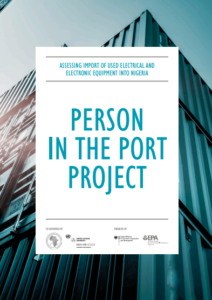A two-year study about used electrical and electronic equipment (UEEE) that were sent to Nigeria, mostly from European ports, showed a continuing problem of non-compliance with international and national rules governing such shipments.
60,000 metric tonnes in both 2015 and 2016 of e-waste reached Nigeria, with 70% of the UEEE reaching Lagos each year in vehicles destined for Nigeria’s second-hand auto market, while just 30% arrived in shipping containers. This volume is prohibited under both the Basel Convention and the EU’s Waste Shipment Directive.
[smlsubform prepend=”GET THE SAFETY4SEA IN YOUR INBOX!” showname=false emailtxt=”” emailholder=”Enter your email address” showsubmit=true submittxt=”Submit” jsthanks=false thankyou=”Thank you for subscribing to our mailing list”]
The study report is co-authored by the Basel Convention Coordinating Centre for Africa (BCCC-Africa) and the Sustainable Cycles (SCYCLE) Programme of United Nations University Vice-Rectorate in Europe, and concluded that more than 60% of the UEEE imported in containers was declared in official paperwork to be household goods or personal effects.
- LCD-TVs and flat panel monitors accounted for 18% of Nigeria’s imported UEEE;
- CRT-TVs and CRT-monitors (14%);
- photocopying machines (13%),
- refrigerators (12%);
- desktop CPUs (7%);
- air conditioners, speakers, and washing machines (6% each);
- and printers (5%).
Of the UEEE imported inside Ro-Ros, almost 98% came from EU member states. Specifically, the UEEE imported in containers originated from ports in the EU (29%), China (24%), and the USA (20%).
77% of Nigeria’s UEEE imports were from EU ports, mainly from Germany and the UK (around 20% each), followed, by Belgium, Netherlands, Spain, and Ireland. China and the USA each account for about 7% of the total imports.
The study found, however, that none of the illegal shipments resulted in consequences for the exporters or importers.
The report was conducted in two Nigerian ports in Lagos under the Person in the Port (PiP) project implemented by the Basel Convention Coordination Centre for the Africa Region (BCCC-Africa) and the United Nations University (UNU) as part of the Solving the E-waste Problem (Step) Initiative.
See more information in the following PDF































































